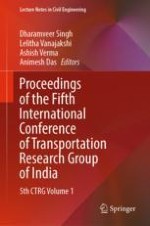2022 | OriginalPaper | Chapter
Activity-Based Model: Requisite for a New Travel Demand Forecasting Approach for India
Authors : Suchismita Nayak, Debapratim Pandit
Published in: Proceedings of the Fifth International Conference of Transportation Research Group of India
Publisher: Springer Nature Singapore
Activate our intelligent search to find suitable subject content or patents.
Select sections of text to find matching patents with Artificial Intelligence. powered by
Select sections of text to find additional relevant content using AI-assisted search. powered by
